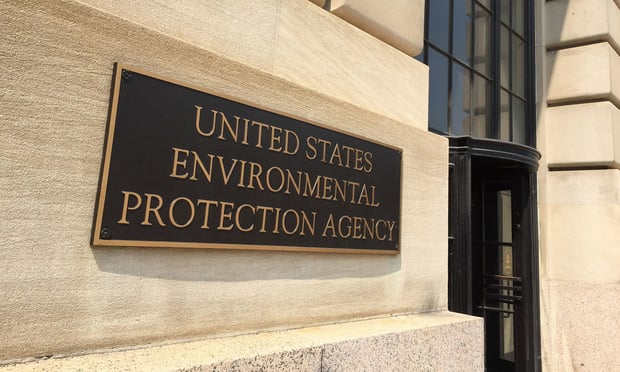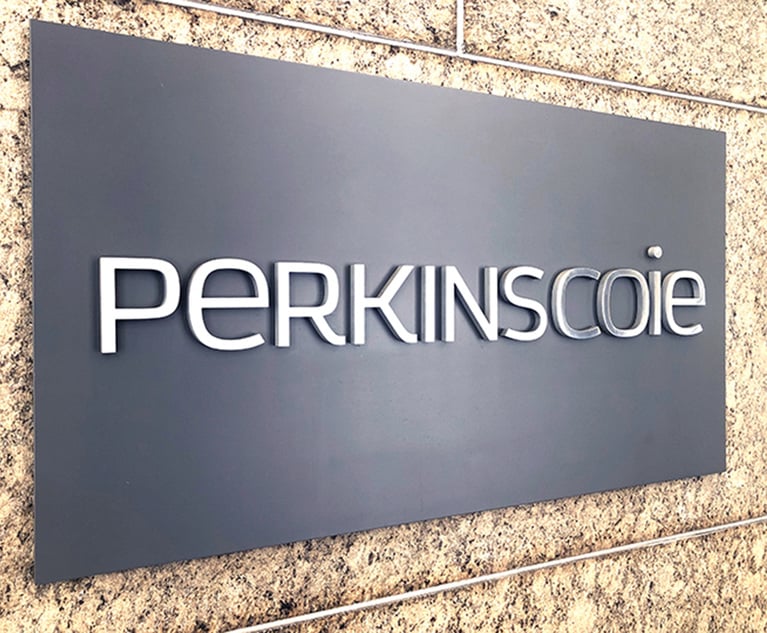EPA Clean Water Case, Once at Supreme Court, Could Make New Splash
The Sackett saga is not over, and may yet become another, even stronger milestone for opponents of regulatory power.
April 12, 2019 at 12:10 PM
4 minute read
 EPA headquarters. Photo: Diego M. Radzinschi/ALM
EPA headquarters. Photo: Diego M. Radzinschi/ALM
The U.S. Supreme Court's 2012 decision in Sackett v. Environmental Protection Agency, a landmark in the conservative campaign to weaken the administrative state, could soon make its way back to the high court.
The court ruled that the Sackett family, blocked by the EPA from building a house on their Idaho half-acre lot, had the right to challenge the agency's Clean Water Act enforcement order in court. In a 2017 Federalist Society speech, then-White House Counsel Donald McGahn praised the ruling as a win in the war against “regulatory despotism.”
But now, seven years after the court's decision, the ruling has turned out to be a loss for plaintiffs Chantell and Mike Sackett.
On March 31, a federal district judge in Idaho who handled the Sacketts' challenge ruled that the EPA was correct in asserting that the Sacketts' property was a wetland protected by the Clean Water Act. The ruling by senior Judge Edward Dodge made no mention of the Supreme Court case.
“The EPA's determination that plaintiffs' property is a wetland is reasonable and supported by the materials in the Administrative Record,” said Lodge, an appointee of President George H.W. Bush.
The Sackett saga is not over, and may yet become another, even stronger milestone for opponents of regulatory power, now that Trump administration appointees have joined lower courts, the Supreme Court, and regulatory agencies.
“The Sacketts are clearly disappointed. They still own the property and they want to have a house built there,” said Tony Francois, a senior attorney at the Pacific Legal Foundation, which carried the Sacketts' cause to the Supreme Court and back. “We are going to file an appeal. There were significant errors in the decision.”
But Francois indicated that the second round of the Sackett case could have broader impact than ultimately allowing the Sacketts to build their house.
Lodge's ruling cites the 2006 Supreme Court decision Rapanos v. United States in asserting that the EPA had jurisdiction over the Sackett property, because it meets the “significant nexus” test established in Rapanos.
Because Rapanos was invoked, Francois said, “we do think the [Sackett] case would provide a vehicle to reconsider Rapanos.”
Conservatives have long criticized the “significant nexus” standard as a vague rule that could apply to most of the nation's acreage. The court was split 4-1-4 in Rapanos, with Justice Anthony Kennedy's solo opinion carrying the day with his “significant nexus” formulation.
Now that Kennedy has retired, his successor, Brett Kavanaugh, may have a different view, perhaps more akin to Scalia's opinion in Rapanos. Scalia said the act only covers “relatively permanent, standing or continuously flowing bodies of water” and wetlands with “a continuous surface connection to such water bodies.”
Any new developments on Rapanos could, in turn, affect the Trump administration's efforts to erase Obama-era definitions of “waters of the United States” and replace them with a rule that adopts Scalia's view.
Read the Idaho judge's newest order in Sackett v. EPA:
Read more:
Roberts Straddles the Middle as Gorsuch Questions Federal Regulatory Power
Don't Overturn Key Regulatory Rulings, US Solicitor Tells Supreme Court
Justices Thomas and Gorsuch Call for Curbs on Federal Agency Power
Supreme Court Tees Up Major Challenge to Power of Federal Regulators
This content has been archived. It is available through our partners, LexisNexis® and Bloomberg Law.
To view this content, please continue to their sites.
Not a Lexis Subscriber?
Subscribe Now
Not a Bloomberg Law Subscriber?
Subscribe Now
NOT FOR REPRINT
© 2025 ALM Global, LLC, All Rights Reserved. Request academic re-use from www.copyright.com. All other uses, submit a request to [email protected]. For more information visit Asset & Logo Licensing.
You Might Like
View All
Trump's DOJ Delays Releasing Jan. 6 FBI Agents List Under Consent Order
3 minute read
Judge Grills DOJ on Trump’s Birthright Citizenship Executive Order

Perkins Coie Backs Challenge to Trump's Ban on Transgender Military Service
4 minute read
Selendy Gay Files Lawsuit Challenging Trump's Workforce Reclassification EO
2 minute readTrending Stories
- 1ACC CLO Survey Waves Warning Flags for Boards
- 2States Accuse Trump of Thwarting Court's Funding Restoration Order
- 3Microsoft Becomes Latest Tech Company to Face Claims of Stealing Marketing Commissions From Influencers
- 4Coral Gables Attorney Busted for Stalking Lawyer
- 5Trump's DOJ Delays Releasing Jan. 6 FBI Agents List Under Consent Order
Who Got The Work
J. Brugh Lower of Gibbons has entered an appearance for industrial equipment supplier Devco Corporation in a pending trademark infringement lawsuit. The suit, accusing the defendant of selling knock-off Graco products, was filed Dec. 18 in New Jersey District Court by Rivkin Radler on behalf of Graco Inc. and Graco Minnesota. The case, assigned to U.S. District Judge Zahid N. Quraishi, is 3:24-cv-11294, Graco Inc. et al v. Devco Corporation.
Who Got The Work
Rebecca Maller-Stein and Kent A. Yalowitz of Arnold & Porter Kaye Scholer have entered their appearances for Hanaco Venture Capital and its executives, Lior Prosor and David Frankel, in a pending securities lawsuit. The action, filed on Dec. 24 in New York Southern District Court by Zell, Aron & Co. on behalf of Goldeneye Advisors, accuses the defendants of negligently and fraudulently managing the plaintiff's $1 million investment. The case, assigned to U.S. District Judge Vernon S. Broderick, is 1:24-cv-09918, Goldeneye Advisors, LLC v. Hanaco Venture Capital, Ltd. et al.
Who Got The Work
Attorneys from A&O Shearman has stepped in as defense counsel for Toronto-Dominion Bank and other defendants in a pending securities class action. The suit, filed Dec. 11 in New York Southern District Court by Bleichmar Fonti & Auld, accuses the defendants of concealing the bank's 'pervasive' deficiencies in regards to its compliance with the Bank Secrecy Act and the quality of its anti-money laundering controls. The case, assigned to U.S. District Judge Arun Subramanian, is 1:24-cv-09445, Gonzalez v. The Toronto-Dominion Bank et al.
Who Got The Work
Crown Castle International, a Pennsylvania company providing shared communications infrastructure, has turned to Luke D. Wolf of Gordon Rees Scully Mansukhani to fend off a pending breach-of-contract lawsuit. The court action, filed Nov. 25 in Michigan Eastern District Court by Hooper Hathaway PC on behalf of The Town Residences LLC, accuses Crown Castle of failing to transfer approximately $30,000 in utility payments from T-Mobile in breach of a roof-top lease and assignment agreement. The case, assigned to U.S. District Judge Susan K. Declercq, is 2:24-cv-13131, The Town Residences LLC v. T-Mobile US, Inc. et al.
Who Got The Work
Wilfred P. Coronato and Daniel M. Schwartz of McCarter & English have stepped in as defense counsel to Electrolux Home Products Inc. in a pending product liability lawsuit. The court action, filed Nov. 26 in New York Eastern District Court by Poulos Lopiccolo PC and Nagel Rice LLP on behalf of David Stern, alleges that the defendant's refrigerators’ drawers and shelving repeatedly break and fall apart within months after purchase. The case, assigned to U.S. District Judge Joan M. Azrack, is 2:24-cv-08204, Stern v. Electrolux Home Products, Inc.
Featured Firms
Law Offices of Gary Martin Hays & Associates, P.C.
(470) 294-1674
Law Offices of Mark E. Salomone
(857) 444-6468
Smith & Hassler
(713) 739-1250








